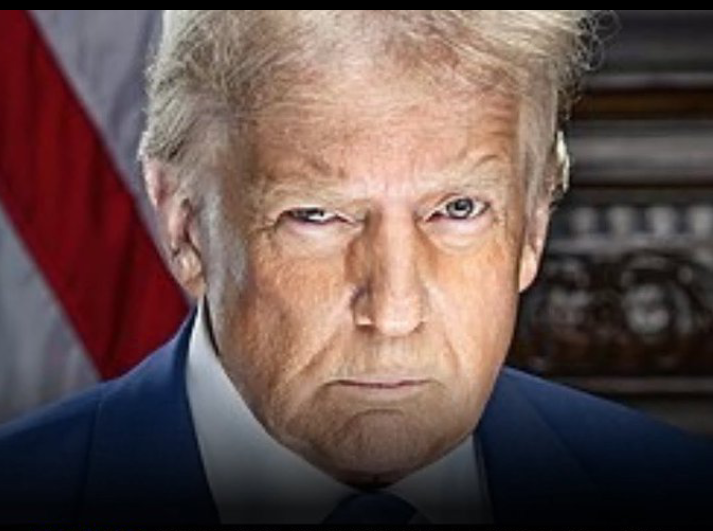
Trump Declares Harsh Penalty: One-Year Jail Term for Anyone Who Burns the American Flag

In a move that has already sparked nationwide outrage, fierce debate, and a tidal wave of reactions from both supporters and critics, former U.S. President Donald Trump has announced a new directive calling for the immediate arrest and imprisonment of anyone caught burning the American flag. The order, which Trump described as a long-overdue step in protecting “the honor and dignity of the greatest nation on earth,” mandates that individuals convicted of flag desecration face a mandatory one-year prison sentence.
Speaking at a rally filled with chants of “USA! USA!” and surrounded by supporters waving American flags, Trump delivered the announcement with his signature bravado. He declared that the American flag is not just cloth and colors, but the living symbol of freedom, sacrifice, and national pride. “When you burn the flag, you don’t just insult America—you insult every veteran, every family who lost a soldier, and every citizen who loves this country,” Trump said, drawing thunderous applause. He insisted that the First Amendment, which guarantees freedom of speech, “does not give anyone the right to destroy the sacred symbol of our unity.”
The directive quickly ignited controversy, as civil liberties groups and constitutional scholars rushed to condemn the move as unconstitutional. The American Civil Liberties Union (ACLU) issued a blistering statement within hours, arguing that flag burning, however offensive it may seem, has been repeatedly upheld by the U.S. Supreme Court as a form of protected speech under the First Amendment. “The Constitution is clear: no president, not even Donald Trump, has the power to criminalize political expression just because he doesn’t like it,” the statement read. Legal experts echoed this, pointing to landmark cases like Texas v. Johnson (1989) and United States v. Eichman (1990), where the Supreme Court struck down laws banning flag desecration.
Despite this legal precedent, Trump’s call has already found enthusiastic support among his political base, with many conservatives and veterans’ groups praising the move as a long-overdue act of patriotism. Social media lit up with hashtags like #ProtectTheFlag and #AmericaFirst, as thousands of supporters shared images of themselves proudly holding the flag while demanding respect for national symbols. One Marine veteran at the rally said, “I buried friends who fought under that flag. Watching someone burn it is like spitting on their graves. If locking people up stops that, then I’m all for it.”
But not everyone agreed. Across major cities, protesters gathered almost immediately to denounce the announcement, some defiantly setting flags ablaze as a direct challenge to Trump’s order. In New York’s Times Square, dozens of demonstrators chanted “Free speech is not a crime!” while holding banners that read “Dissent is patriotic.” A student activist shouted through a megaphone, “The flag is supposed to represent freedom, not authoritarian punishment. If Trump throws people in jail for burning cloth, then what’s next?” Police made no arrests during these protests, but the tension highlighted the sharp divide the directive has opened.
Political analysts note that Trump’s renewed focus on flag burning plays directly into his long-standing strategy of galvanizing his base through culture-war issues. Ever since his presidency, he has repeatedly condemned NFL players for kneeling during the national anthem, college students for protesting against conservative speakers, and now, once again, Americans who burn the flag. By framing the issue as a battle between patriots and those who “hate America,” Trump has reignited a debate that has simmered in American politics for decades.
On Capitol Hill, the reaction was predictably split along party lines. Republican lawmakers largely expressed support, with some announcing plans to draft legislation that would back Trump’s order and solidify it in law. Senator Tom Cotton praised the move, saying, “If you cannot show basic respect for the flag, you don’t deserve to enjoy the freedoms it represents.” Meanwhile, Democrats blasted the directive as unconstitutional and dangerous, with House Minority Leader Hakeem Jeffries warning, “This is nothing more than a blatant attack on free speech and a dangerous slide toward authoritarianism. Today it’s flag burning. Tomorrow it could be any criticism of the government.”
The controversy has also triggered international attention, with global media outlets covering the announcement as yet another example of America’s deep polarization. Some foreign commentators noted the irony of the United States, often hailed as the world’s champion of free speech, threatening imprisonment for symbolic political acts. Human rights organizations also weighed in, warning that punishing flag burning with prison time aligns more with authoritarian regimes than with democratic values.
Meanwhile, legal experts are already predicting a swift court battle if Trump attempts to enforce the directive. “Any arrests made under this order will be challenged in court immediately, and given the strong precedent from the Supreme Court, they will almost certainly be struck down,” said Laurence Tribe, a constitutional law professor at Harvard. He added, “This is political theater designed to stir emotions, not serious policy.”
Yet for Trump’s supporters, legality may be less important than symbolism. At the rally where the announcement was made, attendees erupted in cheers as Trump promised to “end the disgrace of flag burning once and for all.” Supporters interviewed by news outlets said they were tired of what they described as “disrespectful liberals” using free speech as an excuse to insult America. One man from Texas said, “We need law and order. If the flag doesn’t mean anything, then nothing means anything.”
The issue is expected to dominate political discourse in the coming weeks, especially as Trump continues to position himself for another run at the White House. By elevating the debate over flag burning, he has once again placed himself at the center of a cultural firestorm, testing the limits of constitutional freedoms and the depth of America’s political divide. For critics, the directive represents an alarming attack on democratic values; for supporters, it is a long-overdue defense of national pride.
As the dust settles, one thing is clear: Trump’s order has reopened one of the most emotionally charged debates in American political history, pitting the cherished right of free expression against the deeply held reverence for national symbols. Whether the courts, Congress, or the American people will ultimately decide the fate of this directive remains to be seen. For now, the stars and stripes once again stand not only as a symbol of unity but also as the center of a fierce and polarizing battle over the meaning of freedom itself.


